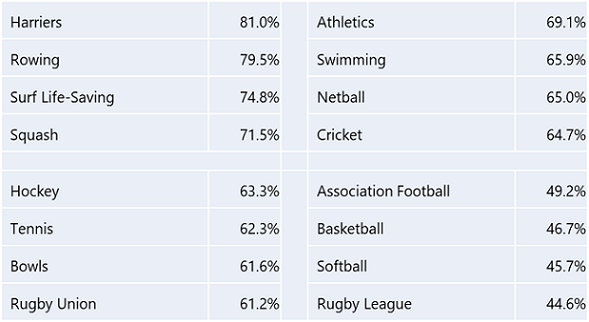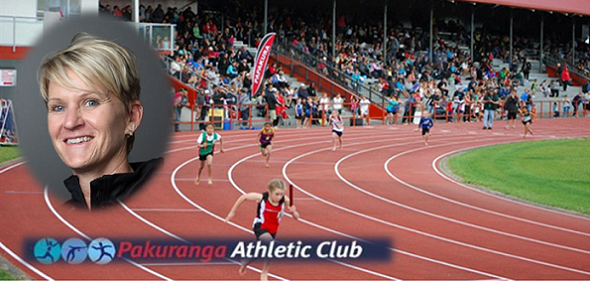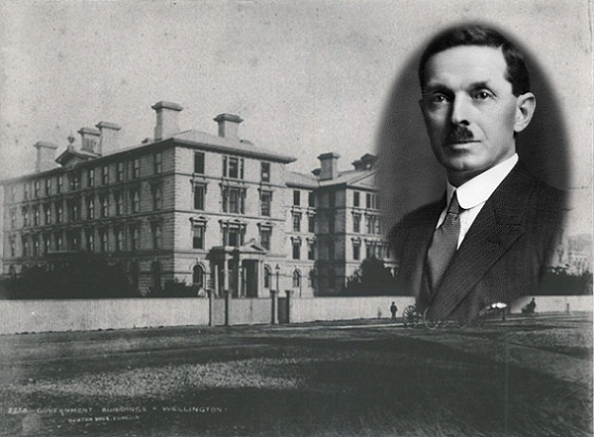Issue 7 : 10 June 2018
Talofa Lava, Kia Orana, Malo E Leilei, Tena Koutou, Hello ...
... and welcome to the latest issue of “For The Love Of The Game”, the official e-zine of the New Zealand Amateur Sport Association Inc. We hope you enjoy reading the articles below.
If you have any feedback on this issue, ideas for future articles, or would like to contact the Editor, please click here. And, you are invited to forward the e-zine to others you know, who may be interested in reading it.
If you are interested in applying for membership of the Association, please click here.
ACCER – A New Measure Of Amateur Club Community Engagement ...
The Register of Incorporated Societies, established in 1908, provides an interesting insight to the number of Amateur Sports Clubs in our national communities which are operated under a Constitution and which have a formal financial governance structure.
By calculating the number of “active” Clubs as a percentage of total Clubs listed on the Register (i.e. including those that have been “struck-off”), and recognising the level of community effort required to operate and sustain an incorporated body, it’s possible to gain insight to the extent to which a sporting code enjoys wider community support.
Using this measure, (known as the “Amateur Club Community Engagement Ratio”, or ACCER), the higher the percentage, the greater the number of Clubs that have stayed active in the community, over time. Based on all data extracted from the Register (comprising the records of nearly 5,000 registered entities), the initial national ACCER is calculated as 60.8%.
Following is the ACCER, by sporting code.

Bowls has the largest number of Clubs compared to any other sporting code, while Harriers has the least. Factors which will influence the ACCER for any given sporting code include the number of Clubs formed nationally (since 1908) that elected to incorporate, as well as the year that the sporting code was itself established.
Over time, the ACCER will be further developed, including analysis of urban and provincial data and the average life-time of Clubs by sporting code.
The ACCER is intended as a fore-runner to a more comprehensive survey of Amateur Sports Clubs to be undertaken by the Association, in the future.
If you would like to know more about ACCER, please contact the Association, by clicking here.
Hellier Recognised By Sporting Community ...
Finding new ways to engage youth in athletics is one of the challenges new Officer of the New Zealand Order of Merit, Kirsten Hellier believes needs to be overcome, as part of maintaining healthy New Zealand communities. Hellier, who received her award in last Monday’s "Queen's Birthday Honours", was the first New Zealand woman to throw the javelin 50 and 60 metres.
Speaking with the Editor this week, she suggested that increasing the “team” aspect of athletics and reducing the competitiveness of elite development at an early age, are two ways to bring more young people, particular teenagers and young adults, back into the sport

(Kirsten Hellier, appointed an Officer of the New Zealand Order of Merit)
Hellier first became involved in organised athletics as a teenager at Macleans College, before joining the Manurewa and Pakuranga Clubs, where her technical skills as a thrower were honed under the coaching of Max Stewart. Following her subsequent years of international competition, she has herself become an internationally renowned Coach, including coaching and mentoring Dame Valerie Adams between 1998 and 2010.
Noting the “alarming” drop-off in youth membership of athletics clubs, Hellier observes that while many athletes do not realise their full potential until later in life, fewer teenagers are incentivised to become adult members of Clubs. Additionally, those involved in supporting athletics as adult volunteers are also facing pressure, as time constraints and hurdles to participation increase.
In reflecting on her Queen's Birthday Honour, Hellier says that “the role you have in sport is not the measure of your success; rather it’s the success you help create for others that really counts”. In this regard, “helping young people to become good people”, is her goal.

The Association congratulates Kirsten on her award and wishes her ongoing success in coaching young New Zealanders to realise their sporting potential.
Spacewise Amateur Sports Hour - Radio Show ...
Join Dave Piper, Adam Julian and Sandy Antipas every Friday at 12.00pm, as they provide insightful updates on amateur sporting clubs and individuals across a broad range of sporting codes on the "Amateur Sports Hour".
Click here to listen to the latest show, in which the team speak with Stephen Jenness from the Black Sticks, provides an update on College Basketball, and talks to the "Wellington Orcas" as they head to the National Women's Rugby League Tournament, in Auckland.

The "Amateur Sports Hour" is brought to you through the generous support of Dion Ross and the team at Spacewise New Zealand, specialists in the hire of new and used shipping containers. We thank them for their ongoing support.
Study Suggests Win-First Focus For Youth Carries Risks ...
An article from the media this week, reported on the results of a recent study undertaken by Auckland University of Technology's (AUT) Sports Performance Research Institute on youth sports injuries, in which it was concluded that “sports need to look at the win-first attitude of teams, and how early the sports introduce representative sides."

You can read the full story here.
In 2016, Arne Gullich from Germany's Technische Universtat Kaiserslautern, published a study he undertook on the results of international athletes in the “Journal of Sports Sciences”. He compared 83 people who had won medals at Olympic Games and international competitions, with a similar number of professional athletes who had not won medals.

(Arne Gullich's study looked at early sport specialisation by international athletes)
His study revealed that the medallists specialised in their main sport later than the non-medallists, and that the medallists had done less training in their main sport as children and adolescents. Gullich's study gives support to the view that a focus on elite performance at a young age does not necessarily create the conditions for elite performance as an adult.
New Zealand’s First Sport Census ...
The first census of sports in New Zealand was undertaken by the Government Statistician, Malcolm Fraser, 95 years ago, in 1924.
At that time, there were 40,000 Rugby Union players in New Zealand, of which 12,000 (30%) were at school, with the sport comprising 650 affiliated Clubs. (Today, 80% of Rugby Union players are of school age and only 20% are adult members of community clubs).
In 1924, Rugby League had 3,818 active players, while Association Football (Soccer) had around 6,000 active players, (compared to around 135,000 today).

Tennis was the second most popular sport in New Zealand in 1924, with 19,967 members (representing 302 Clubs), followed by Lawn Bowls with 269 Clubs representing 13,943 members. In terms of other amateur sports, Golf comprised 96 Clubs (9,115 members), Cricket was the fifth largest sport, with 231 Clubs registered with the New Zealand Cricket Council (comprising 8,566 members, of which 25% were in schools), with Hockey and Swimming also recording nearly 6,500 active members respectively.

(Malcolm Fraser, the Government Statistician who undertook NZ's first Sports Census)
Reviewing the 1924 census, the Government Statistician remarked "one of the best organised sports bodies in the Dominion is that controlling the game of Bowls. This sport is usually understood as being played mainly by men more or less advanced in years, and as such has little in the way of competition, because, outside Golf and Tennis, the sports indulged in do not, for obvious reasons, attract such persons. Cricket requires special facilities for playing, and, moreover, requires special aptitude and much practice on the part of players; hence, the number of players is considerably less than those playing Tennis, for instance.”
Fraser's comments on certain sports requiring "special facilities" and "special aptitude and much practice", are insightful when considering factors either hindering (or fostering) growth in New Zealand's amateur sporting codes today.
From The Archives ...
"AMATEUR" DEFINED
EVENING POST, VOLUME CXIX, ISSUE 114, 16 MAY 1935
“BRUSSELS, May 15. The International Sports Congress, at which nineteen international federations are represented, has decided that an amateur is one indulging in sport solely owing to love of sport, and for amusement, without wishing to gain in a mercenary manner, directly or indirectly.”
In 1935, Belgium hosted an International Exposition, attended by 30 countries. It attracted around 20 million visitors. The same year, Brussels hosted the International Sports Congress at which the concept of amateurism in sport was keenly debated, given implications for the Berlin Summer Olympics, to be held the following year.
Today, CW46 of New Zealand's Income Tax Act provides a helpful regulatory definition of an amateur sports body (and by inference, any person associated with that body as a member).
For tax purposes, a sport is defined as amateur where a club, society, association, or trust is established to promote a sport, for the recreation or entertainment of the general public.
In the context of the Act, the definition requires that no part of the funds of the amateur sports body can be used for the private financial profit of a member, proprietor, shareholder, beneficiary, or associate.

In summary, to be considered amateur, the governing body (club, society, association, or trust) must be established for recreation purposes and not-for-profit of itself, (or any of its members).
The Final Word ...
“Champions are not the ones who always win races; champions are the ones who get out there and try".
(Simon Sinek)